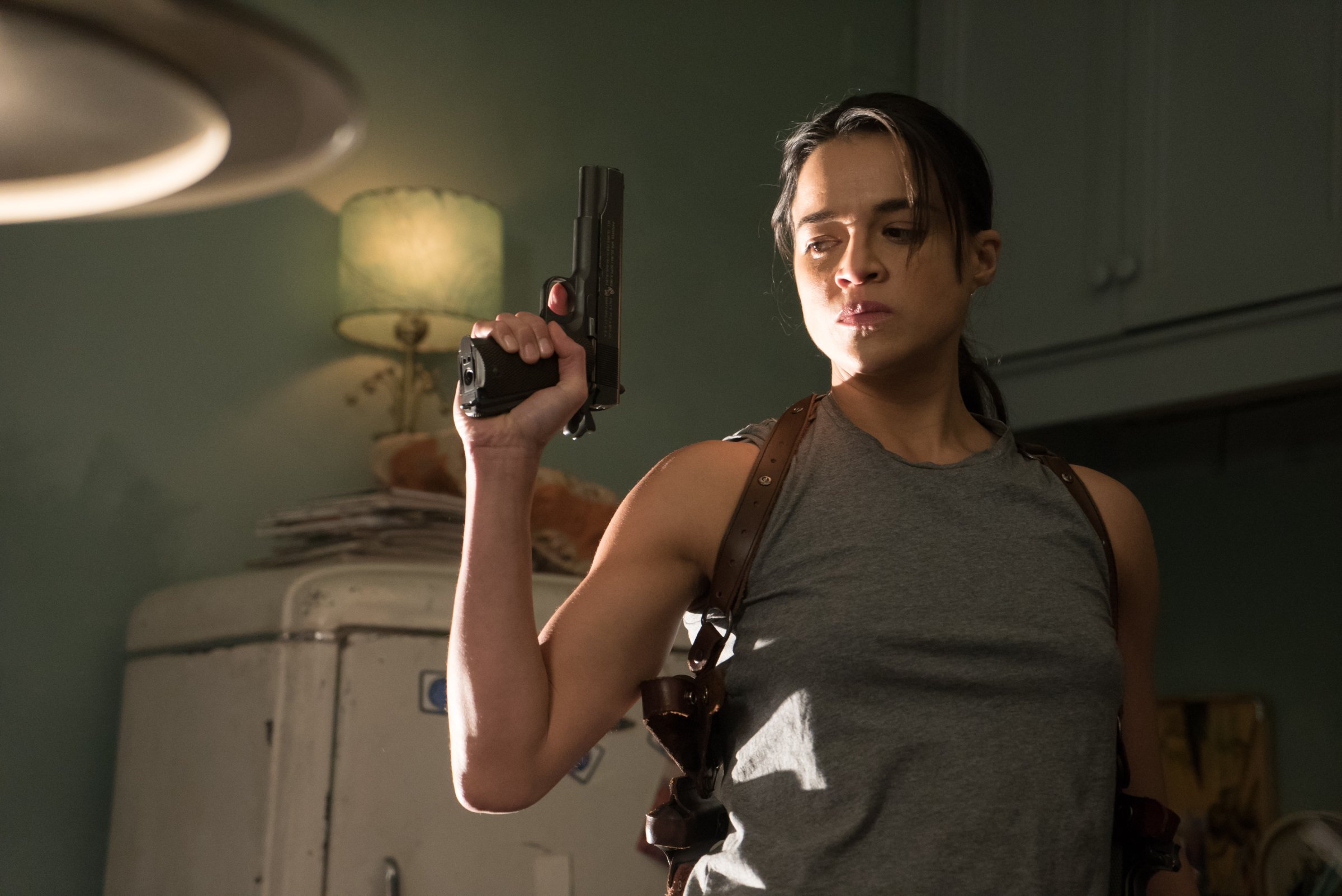
Writer-producer-director and pulp maestro Walter Hill has been rattling cages and delivering quality thrills since the early 1970s. He made his directorial debut with Hard Times (1975), a scrappy, bruising drama starring Charles Bronson as a Depression-era bare-knuckles boxer. He’s also the guy behind the New York City street-gang extravaganza The Warriors (1979), the stolen-gold nail biter Trespass (1992) and The Driver (1978), with Ryan O’Neal, the ruminative getaway drama that helped inspire Edgar Wright’s upcoming car-chase musical Baby Driver.
Hill has influenced plenty of filmmakers—not just Wright, but also Michael Mann and Quentin Tarantino, to name just a few—though he hasn’t been particularly prolific as a director in recent years. His new film, The Assignment, isn’t likely to win him any new friends: Michelle Rodriguez stars as killer-for-hire Frank Kitchen, whose life is upended when he’s captured and knocked out by a gang of baddies, only to wake up wrapped in bandages—and a woman. The surgeon genius behind this transformation is steely-cool Dr. Rachel Kay (Sigourney Weaver), a straitjacketed jailbird who tells her own story to an earnest prison shrink played by Tony Shalhoub. Between Dr. Kay’s calculating testimony and and Frank’s sometimes anguished first-person account, delivered in voice-over, we piece together exactly what happened to Frank and how he/she went about wreaking revenge.
Not all of Hill’s movies are great, and The Assignment certainly isn’t. Maybe, in the strictest terms, it isn’t even any good. But even a mediocre Walter Hill film has more style and energy—and a finer sense of the sweet spot between joy and despair—than ninety percent of the action thrillers that get made today. Considering its over-the-top plot mechanics, The Assignment isn’t quite as nutso and passionate as it ought to be. Even the violence, gritty at times, feels a little impersonal and detached. But the film’s tawdry precision is compelling by itself.
In the opening sequence, we see a face in profile, almost entirely obscured by gauze, as a throaty voice launches into a preamble: “I killed a lot of guys…” Before we meet the teller of the tale—as a she, she doesn’t even have a name—we meet the man she used to be. Frank is a Casanova with piercing eyes and soot-black facial hair that could have been lifted from a 1960s dime-store toy, the one where you use a magnetic stylus to arrange piles of metal shavings, encased in a blister-pack bubble, into outlandish beards and sideburns for a cartoon man’s face.
In other words, it looks fake. But even the exaggerated macho-ness of that hair may be a kind of intentional overstatement. Frank goes out and picks up a young woman, Johnnie (Caitlin Gerard). They have hot, rowdy sex, and Johnnie suggests she might like to see Frank again. He’s positioned, perfectly, to be the quintessential clueless, oafish guy who never calls again.
But Frank does call Johnnie again—only he does so after he’s no longer Frank, after his previous identity, with all its he-man hallmarks, has been quite literally cut away. Rodriguez gives a smart, sharp performance here. She’s playing a character that is, almost literally, a cartoon. Every once in a while, Hill freezes a frame and transforms the image into a literal comic-book panel, a way of reminding that we’re watching something beyond reality (and a device he used in his own cut of The Warriors years ago, before it became commonplace). But as Rodriguez plays them, her character’s anguish and confusion are hardly cartoony.
She’s lost in her new identity, but the problem is less that she’s adjusting to being a woman than that she’s learning new things about being human. She adopts a pit-bull named Poncho. He’s as tender-tough as she is, as unsure exactly how he should act or what he should be. Rodriguez has the face of someone who’s just feeling her way along. Everything is a new puzzle, but there are pleasant surprises too. When her face registers relief or pleasure, it’s like the sun elbowing a thundercloud out of the way.
When The Assignment played at the Toronto Film Festival last fall—at that time, it was called (re)Assignment, a much better title, though its earlier working title, Tomboy, was perhaps best of all—it drew criticism for being insensitive toward, or at least cavalier about, transgender issues. But even if you discount the fact that films aren’t required to be public service announcements—in fact, they’re usually pretty bad when they are—the ideas behind The Assignment are more complex than they might seem on the surface. Many of them are also pure Walter Hill: The script was written by journalist, novelist and screenwriter Denis Hamill more than 30 years ago, and it borrows pulp elements of previous Hill films like Johnny Handsome (1989), in which Mickey Rourke plays a deformed gangster whose face is transformed by plastic surgery.
In Hill’s movies, men make mistakes right and left, and suffer for them. In The Assignment, Frank doesn’t choose to become a woman, and he desperately wants not to be one. But what if his enforced rebirth represents a second chance, a chance to be better? That’s one of the ideas The Assignment, in its sometimes awkward way, flirts with. It also crawls through the dust toward another cruel reality: Maybe it takes a woman who used to be a man to understand just how much of a man’s world this really is.
More Must-Reads from TIME
- Why Trump’s Message Worked on Latino Men
- What Trump’s Win Could Mean for Housing
- The 100 Must-Read Books of 2024
- Sleep Doctors Share the 1 Tip That’s Changed Their Lives
- Column: Let’s Bring Back Romance
- What It’s Like to Have Long COVID As a Kid
- FX’s Say Nothing Is the Must-Watch Political Thriller of 2024
- Merle Bombardieri Is Helping People Make the Baby Decision
Contact us at letters@time.com